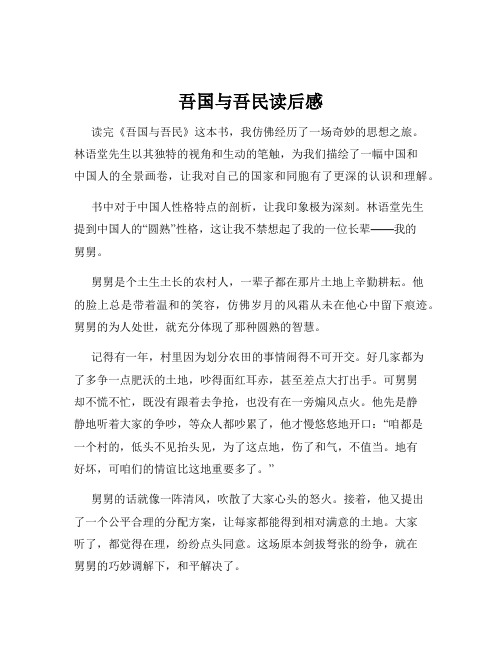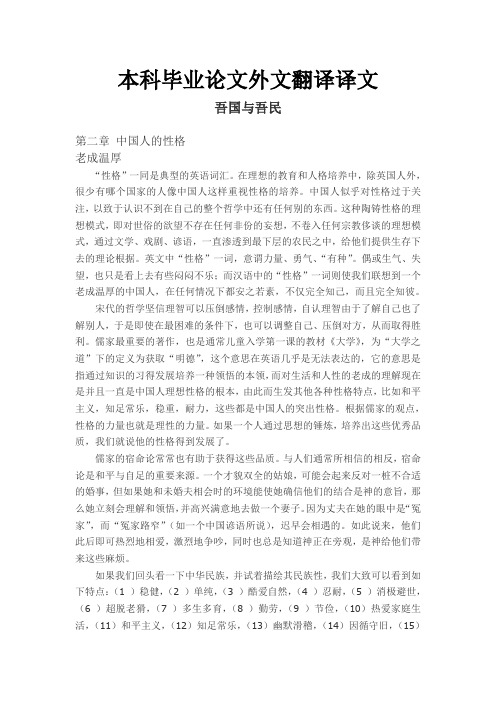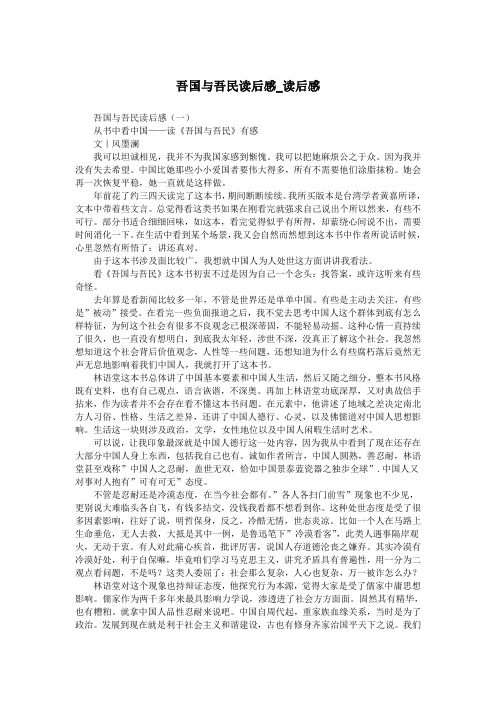吾国与吾民
简析《吾国与吾民》的中庸思想

简析《吾国与吾民》的中庸思想摘要:林语堂先生细密观察鉴定中国人的生活,以《吾国与吾民》对中国人进行真诚批判,其中又含殷切希望。
纵观全书,中庸思想为中国人从古至今而形成的国民性之一大特点,中国人特有的普通感性、人文主义也与此相关,而林语堂本人的分析视角亦不能脱离中庸之道。
关键词:《吾国与吾民》中庸之道普通感性人文主义1793年,英使马戛尔尼首次访华,船队航行到好望角时,南半球的夏天雾中带雪。
倏然此景,马戛尔尼想起曾在伊尔库茨克担任要职并且和中国人多次谈判过边界问题的勃拉弟捷夫(俄国人)的一句话:“同中国打交道就像‘在雾中航行’一样”。
西方人的眼中,中国人说话做事云里雾里。
勃拉弟捷夫对中国人的评价有管中窥豹之嫌,中国人之所以留给外国人只可意会不可言传的印象,重要原因在于中国人深谙中庸之道,不会像西方人一样对人对事直接表态。
一、中庸之道中庸之道最常见的解释是“执两用中”,拒绝一切过度的道德、学理及行为,亦即“A是对的,B亦未尝错”。
中庸之道是中国人国民性的源头,迸发而出,宛若天上之水,滔滔而成中国人国民性的诸多表现特征:(一)圆熟。
中国人的坚韧不屈大都见于民族危亡社稷安危之时,其余时候中国人绝对是圆熟的,或者至少是把圆熟当作人生境界予以追求的。
圆熟既成,心智便熟。
老子去探望自己生病的老师常枞时说:“夫舌之存乎,岂非以其柔耶?齿之亡乎,岂非以其刚耶?”,舌存齿亡的故事千年不衰,以柔克刚的艺术千年传颂。
人若懂圆熟,便是舌头;人不圆熟,便是刚牙。
圆熟是所有中国人共同的追求。
但是,对圆熟的渴望是立足于自保视角的生存哲学,并不值得称道。
(二)忍耐。
虽然忍字心头一把刀,但中国人坚定地以为,忍耐可使自己少生是非并获得安宁。
纵观中国历史,暴君、暴政常有,却并不是每一次都会引发老百姓的反抗。
中国人要爆发,必须忍无可忍,陈胜吴广走到大泽乡,天降大雨,横竖都是死,还不如揭竿而起拼一拼,倘若当时还有其他活路,两人未必会如此义无反顾。
吾国与吾民

《吾国与吾民》与《中国人的素质》中的知足问题比较古人道,“知足常乐”。
“知足”一个理念在中国历史发展的长河中,已经深入中国人的血液,成为中华民族传统文化中不可缺少的一部分。
在林语堂眼中,知足是民族的值得骄傲与自豪的品质。
然而,在明恩溥看来,这却是一种令人无法理解的劣等民族不思进取的秉性。
这两种观点的不同将会在下文中进行具体的比较与阐释。
一、传统文化与思想对“知足”的影响林语堂写道,“知足又为‘慈祥’、‘和气’的代名词,此等字眼到了旧历新年,大家用朱红笺卸载通行的门联里,这里一半是显赫的箴训,一半为人类智慧,明代学者即以此意劝人‘惜福’。
老子有句格言,现已成为普遍口头禅,叫做‘知足不辱,知止不殆’。
在文学里头,这个意识常转化而为田园思想,乐天主义,吾人可于诗及私人书翰中常遇此等情绪。
”随后,他例举了陆深致其友人书一篇,以及苏轼的《记承天寺夜游》等。
传统文化与知足思想是相互作用的,知足源于中国传统儒家文化中的温和思想,安贫乐道,而不贪得无厌,故孔子曰:“一箪食,一瓢饮,在陋巷,人不堪其忧,回也不改其乐”;而知足思想形成以后,也反过来影响了传统文化,从而转化为文学中的田园思想,乐天主义,作为一种文化保存下来。
在殖民者眼里,知足的行为亦是受中国的历史文化影响而产生并继续存在的。
首先,明恩博承认中国历史悠久,但他认为,正因如此,顽固的保守主义思想根深蒂固,随着时代的发展,中国人一心埋头在自己辉煌的历史中,渴望从已经不适合时代发展的历史中找到新的内涵,并且认为目前的制度是所能拥有的最好的体制,完全没有想要改变,这是愚昧无知的。
这体现了殖民者看问题全球化的视角。
“历史用实例教人道理,这是希腊人的古老的说法。
我们刚才已经谈到,中国人自己的历史就是他们的老师,而他们从中学到的课程全都具有保守的特点。
但是,没有哪个国家是靠了解自己的历史来接受教育的,正如一个人如果只知道亲身经历的事,就不能号称什么都懂一样。
正是在这一点上,中国人的知识有致命的缺憾。
和之恶——林语堂《吾国与吾民》读后感

和之恶——林语堂《吾国与吾民》读后感“但是中国人的圆熟非自书本中得来,而出自社会环境,这个社会见了少年人的盛气热情,会笑出鼻涕。
中国人有——种轻视少年热情的根性,也轻视改革社会的新企图。
他们讥笑少年的躁进,讥笑"天下无难事”之自信,所以中国青年老是被教导在长者面前缩嘴闭口,不许放肆。
中国青年很快地理会这个道理,因此他们不肯憨头憨脑,硬撑革新社会的计划,反而附从讥评,指出种种可能的困难,不利于任何新的尝试。
”——林语堂《吾国与吾民》“和”、“中庸”是封建时代的产物。
现在这样工业化,现代化的社会中,我们可以倡导人与人之间相互尊敬,相互理解的“和”。
但是要分清平庸与和的界限。
“和之恶”对于年轻人来说可能是个伪命题。
为什么和就是恶呢?和气生财不好吗?我认为,和的存在意义不过是一一个手段,而非,是目的。
现如今很多青年把过上好日子,把和气当做必不可少的东西,于是一切民主,民主的交流,民主的决策,民主的生活……但是他们忘了,民主是有局限的,民主害死了苏格拉底,民主选出了特朗普,民主导致台湾“用爱发点”。
“和气”的民主是恶之源,只是走了程序正确,但是结果却是一团糟。
最近有人问我,为什么什么都看不起?我其实不是看不起,而是厌恶这种虚伪的“和”。
因为它抑制了年轻人的个性与才气,毁灭了许多可以变美好的事情。
为了走所谓的程序正确,和气民主,导致最后乱七八糟。
我以前以为这是个别现象,现在发现这是普遍的。
普遍存在于我们周遭的人身上。
我不是推崇专制的人,我是个民主集中制的践行者。
我需要大家明白,必要的民主与支持……要用在需要的地方,而不是事事都要民主天赋的不同,能力的不同决定屁股。
什么时候嘴决定屁股了,推诿找茬成了常事,那这个合作离分崩离析也不远了。
身在高位之人,既要燥,也要仁。
我感觉我们好多时候喜欢高估自己,不知自己走到了什么地步,喜欢凌于他人之上。
我不知这种情况如何改变,但我知道怎么让他被打脸——拿出实力来证明自己。
吾国与吾民第一章英文讲解

吾国与吾民第一章英文讲解Chapter 1: Our Country and Our People An English Explanation。
In this chapter, we delve into the essence of our country and its people, exploring various aspects that define our nation. From a historical, cultural, and geographical perspective, we aim to provide a comprehensive understanding of who we are as a collective.Firstly, let's examine the historical context of our country. We trace our roots back to ancient times, where dynasties rose and fell, leaving behind a rich tapestry of traditions and values. From the Xia, Shang, and Zhou dynasties to the more recent Ming and Qing dynasties, each era has contributed to the formation of our national identity.Moving on to the cultural aspect, we explore the diverse customs, beliefs, and practices that shape oursociety. China boasts a vast array of cultural heritage, including traditional arts, literature, philosophy, and cuisine. From the elegant brushstrokes of Chinese calligraphy to the intricate movements of traditional dance forms like the Beijing Opera, our cultural expressions reflect the depth and beauty of our civilization.Geographically, our country encompasses a vast landmass with diverse landscapes. From the towering peaks of the Himalayas to the fertile plains of the Yangtze River, our natural surroundings have influenced our way of life and economic development. We have also been blessed with abundant natural resources, which have played a significant role in shaping our nation's growth and prosperity.Moreover, it is essential to recognize thecontributions of our people to the development of our country. With a population of over 1.4 billion, China is home to a vibrant and hardworking society. From farmers to scientists, entrepreneurs to artists, our citizens have made significant contributions to various fields,propelling our nation forward on the global stage.In conclusion, Chapter 1 provides an in-depth exploration of our country and our people. By examining our history, culture, geography, and the contributions of our citizens, we gain a holistic understanding of the multifaceted nature of our nation. This chapter sets the foundation for further exploration of our country's achievements, challenges, and aspirations.。
吾国与吾民读后感

吾国与吾民读后感读完《吾国与吾民》这本书,我仿佛经历了一场奇妙的思想之旅。
林语堂先生以其独特的视角和生动的笔触,为我们描绘了一幅中国和中国人的全景画卷,让我对自己的国家和同胞有了更深的认识和理解。
书中对于中国人性格特点的剖析,让我印象极为深刻。
林语堂先生提到中国人的“圆熟”性格,这让我不禁想起了我的一位长辈——我的舅舅。
舅舅是个土生土长的农村人,一辈子都在那片土地上辛勤耕耘。
他的脸上总是带着温和的笑容,仿佛岁月的风霜从未在他心中留下痕迹。
舅舅的为人处世,就充分体现了那种圆熟的智慧。
记得有一年,村里因为划分农田的事情闹得不可开交。
好几家都为了多争一点肥沃的土地,吵得面红耳赤,甚至差点大打出手。
可舅舅却不慌不忙,既没有跟着去争抢,也没有在一旁煽风点火。
他先是静静地听着大家的争吵,等众人都吵累了,他才慢悠悠地开口:“咱都是一个村的,低头不见抬头见,为了这点地,伤了和气,不值当。
地有好坏,可咱们的情谊比这地重要多了。
”舅舅的话就像一阵清风,吹散了大家心头的怒火。
接着,他又提出了一个公平合理的分配方案,让每家都能得到相对满意的土地。
大家听了,都觉得在理,纷纷点头同意。
这场原本剑拔弩张的纷争,就在舅舅的巧妙调解下,和平解决了。
事后,我问舅舅:“您怎么就能想出这么好的办法来?”舅舅笑着说:“这哪是我聪明,是大家心里都明白,只是被一时的利益冲昏了头脑。
我不过是让他们冷静下来,看到这其中的道理罢了。
”从舅舅的身上,我看到了中国人那种善于调和、避免极端的圆熟性格。
他不是用强硬的手段去压制别人,而是以理服人,以情动人,让大家都能心服口服。
书中还谈到了中国人对于家庭的重视,这一点在我的生活中也有着真切的体现。
每年春节,无论身在何处,我们一家人都会想方设法赶回老家团聚。
那几天,家里总是热闹非凡。
大人们忙着准备年夜饭,孩子们则在院子里嬉笑玩耍。
年夜饭是一年中最丰盛的一顿饭。
桌上摆满了各种各样的美味佳肴,有妈妈做的红烧肉,那色泽红亮,肥而不腻,入口即化;有爸爸炖的鸡汤,香气扑鼻,营养丰富;还有奶奶包的饺子,皮薄馅大,咬上一口,满满的都是家的味道。
吾国与吾民英文版摘抄

吾国与吾民英文版摘抄Part 1 BasesPreface:Perhaps I too love my own country, but I take care to conceal it before them, for one may wear the cloak of patriotism to tatters, and in these tatters be paraded through the city streets to death, in China or the rest of the world.The world was made the scapegoat for China's medievalism. Instead of realizing that China was in her own way making her own steps, slowly, it is true, and somewhat ponderously, toward modernity, it was easy hue and cry to say that if it had not been for foreigners she would have been already on an equality, in material terms, with other nations.The Chinese People林语堂真的是实力嘲讽南方人啊:"inured to ease and culture and sophistication, mentally developed but physically retrograde, loving their poetry and their comforts, sleek undergrown men and slim neurasthenic women, fed on birds'-nest soup and lotus seeds, shrewd in business, gifted in belles-lettres, and cowardly in war, ready to roll on the ground and cry for mamma before the lifted fist descends."曾经帝王发源多于陇海铁路附近,当真是南方富庶北方贫瘠要靠抢?"most founders of the great dynasties have come from a rather restricted mountainous area, somewhere around the Lunghai Railway, which includes eastern Honan, southern Hopei, western Shantung and northern Anhui."又一发实力嘲讽我江苏:"Kiangsu has produced no great generals, but has given us some very fine hotel boys." 。
汉语言文学吾国与吾民翻译

本科毕业论文外文翻译译文吾国与吾民第二章中国人的性格老成温厚“性格”一同是典型的英语词汇。
在理想的教育和人格培养中,除英国人外,很少有哪个国家的人像中国人这样重视性格的培养。
中国人似乎对性格过于关注,以致于认识不到在自己的整个哲学中还有任何别的东西。
这种陶铸性格的理想模式,即对世俗的欲望不存在任何非份的妄想,不卷入任何宗教侈谈的理想模式,通过文学、戏剧、谚语,一直渗透到最下层的农民之中,给他们提供生存下去的理论根据。
英文中“性格”一词,意谓力量、勇气、“有种”。
偶或生气、失望,也只是看上去有些闷闷不乐;而汉语中的“性格”一词则使我们联想到一个老成温厚的中国人,在任何情况下都安之若素,不仅完全知己,而且完全知彼。
宋代的哲学坚信理智可以压倒感情,控制感情,自认理智由于了解自己也了解别人,于是即使在最困难的条件下,也可以调整自己、压倒对方,从而取得胜利。
儒家最重要的著作,也是通常儿童入学第一课的教材《大学》,为“大学之道”下的定义为获取“明德”,这个意思在英语几乎是无法表达的,它的意思是指通过知识的习得发展培养一种领悟的本领,而对生活和人性的老成的理解现在是并且一直是中国人理想性格的根本,由此而生发其他各种性格特点,比如和平主义,知足常乐,稳重,耐力,这些都是中国人的突出性格。
根据儒家的观点,性格的力量也就是理性的力量。
如果一个人通过思想的锤炼,培养出这些优秀品质,我们就说他的性格得到发展了。
儒家的宿命论常常也有助于获得这些品质。
与人们通常所相信的相反,宿命论是和平与自足的重要来源。
一个才貌双全的姑娘,可能会起来反对一桩不合适的婚事,但如果她和未婚夫相会时的环境能使她确信他们的结合是神的意旨,那么她立刻会理解和领悟,并高兴满意地去做一个妻子。
因为丈夫在她的眼中是“冤家”,而“冤家路窄”(如一个中国谚语所说),迟早会相遇的。
如此说来,他们此后即可热烈地相爱,激烈地争吵,同时也总是知道神正在旁观,是神给他们带来这些麻烦。
吾国与吾民读后感_读后感.doc

吾国与吾民读后感_读后感吾国与吾民读后感(一)从书中看中国——读《吾国与吾民》有感文|风墨澜我可以坦诚相见,我并不为我国家感到惭愧。
我可以把她麻烦公之于众。
因为我并没有失去希望。
中国比她那些小小爱国者要伟大得多,所有不需要他们涂脂抹粉。
她会再一次恢复平稳,她一直就是这样做。
年前花了约三四天读完了这本书,期间断断续续。
我所买版本是台湾学者黄嘉所译,文本中带着些文言。
总觉得看这类书如果在刚看完就强求自己说出个所以然来,有些不可行。
部分书适合细细回味,如这本,看完觉得似乎有所得,却萦绕心间说不出,需要时间消化一下。
在生活中看到某个场景,我又会自然而然想到这本书中作者所说话时候,心里忽然有所悟了:讲还真对。
由于这本书涉及面比较广,我想就中国人为人处世这方面讲讲我看法。
看《吾国与吾民》这本书初衷不过是因为自己一个念头:找答案,或许这听来有些奇怪。
去年算是看新闻比较多一年,不管是世界还是单单中国。
有些是主动去关注,有些是”被动”接受。
在看完一些负面报道之后,我不觉去思考中国人这个群体到底有怎么样特征,为何这个社会有很多不良观念已根深蒂固,不能轻易动摇。
这种心情一直持续了很久,也一直没有想明白,到底我太年轻,涉世不深,没真正了解这个社会。
我忽然想知道这个社会背后价值观念,人性等一些问题,还想知道为什么有些腐朽落后竟然无声无息地影响着我们中国人,我就打开了这本书。
林语堂这本书总体讲了中国基本要素和中国人生活,然后又随之细分,整本书风格既有史料,也有自己观点,语言诙谐,不深奥。
再加上林语堂功底深厚,又对典故信手拈来,作为读者并不会存在看不懂这本书问题。
在元素中,他讲述了地域之差决定南北方人习俗、性格、生活之差异,还讲了中国人德行、心灵,以及佛儒道对中国人思想影响。
生活这一块则涉及政治,文学,女性地位以及中国人闲暇生活时艺术。
可以说,让我印象最深就是中国人德行这一处内容,因为我从中看到了现在还存在大部分中国人身上东西,包括我自己也有。
- 1、下载文档前请自行甄别文档内容的完整性,平台不提供额外的编辑、内容补充、找答案等附加服务。
- 2、"仅部分预览"的文档,不可在线预览部分如存在完整性等问题,可反馈申请退款(可完整预览的文档不适用该条件!)。
- 3、如文档侵犯您的权益,请联系客服反馈,我们会尽快为您处理(人工客服工作时间:9:00-18:30)。
Chapter Two THE CHINESE CHARACTER
MELLOWNESS "CHARACTER" is a typically English word. Apart from the English, few nations have laid such stress on character in their ideal of education and manhood as the Chinese. The Chinese seem to be so preoccupied with it that in their whole philosophy they have not been able to think of anything else. Totally devoid of any extra-mundane interests, and without getting involved in any religious claptrap, this ideal of building of character has, through the influence of their literature, the theatre, and proverbs, permeated to the lowliest peasant, and provided him with a philosophy of life. But while the English word "character" suggests strength, courage, "guts," and looking merely glum in moments of anger or disappointment, the Chinese word for "character" brings to us the vision of a mature man of mellow temperament, retaining an equanimity of mind under all circumstances, with a complete understanding not only of himself but of his fellow-men. 【彭婉昕】
The Sung philosophy has a tremendous confidence in the power and supremacy of the mind over emotions, and an overweening assurance that the human mind, through its understanding of oneself and of one's fellow-men, is able to adjust itself to the mostunfavourable circumstances and triumph over them. The Great Learning, the Confucian primer : with which Chinese schoolboys used to begin their first lesson at school,. defines the "great learning" as consisting of the attainment of a "dear character," which is almost an impossible English expression, but by which is meant the illumination of understanding, developed and cultivated through knowledge* A mellow understanding of life and of human nature is, and always has been, the Chinese ideal of character, and from that understanding other qualities are derived, such as pacifism, contentment, calm and strength of endurance which distinguish the Chinese character. Strength of character is really strength of the mind, according to the Gonfucianists. When a man has cultivated these virtues through mental discipline, we say he has developed his character. 【姜妍君】
Very often these virtues are attained also through the help of Confucian fatalism. For contrary to the general belief, fatalism is a great source of peace and contentment. A beautiful and talented girl may rebel against an unsuitable marriage, but if the peculiar circumstances of her meeting with her fianc?can convince her that it is the gods who have decreed the match, she can at once, through an act of understanding, become a happy and contented wife. For the husband has in her eyes become a "predestined enemy," and the Chinese proverb says "predestined enemies will always meet in a narrow alleyway." With that understanding, they can love and fight each other furiously ever after, knowing all the time that the gods are looking on and causing them all this trouble. 【王立婷】
If we review the Chinese race and try to picture their national characteristics,, we shall probably find the following traits of character: (i) sanity, (2) simplicity, (3) love of nature, (4) patience, (5) indifference, (6) old roguery, (7) fecundity, (8) industry, (9) frugality, (10) love of family life, (u) pacifism, (12) contentment, (13) humour, (14) conservatism, and (15) sensuality. They are, on the whole, simple great qualities that would adorn any nation.1 Some of these characteristics are vices rather than virtues, and others are neutral qualities; they are the weakness as well as the strength of the Chinese nation. Too much mental sanity often clips imagination of its wings and deprives the race of its moments of blissful madness; pacifism can become a vice of cowardice; patience, again, may bring about a morbid tolerance of evil; conservatism may at times be a mere synonym for sloth and laziness, and fecundity may be a racial virtue but an individual vice. 【王文艳】 But all these qualities may be summed up in the word mellowness. They are passive qualities, suggestive of calm and passive strength rather than as youthful vigour and romance. They suggest the qualities of a civilization built for strength and endurance rather than for progress and conquest. For it is a civilization which enables man to find peace under any circumstance, and when a man is at peace with himself, he cannot understand the youthful enthusiasm for progress and reform. It is the old culture of an old people who know life for what it is worth and do not strive for the unattainable. The supremacy of the Chinese mind flays its own hopes and desires, and by making the supreme realization that happiness is an unattainable bluebird and giving up the quest for it?"taking a step backwards," as the Chinese expression goes it finds happiness nestling in its own hand, almost strangled to death during the hot pursuit of an imagined shadow. As a Ming scholar puts it, "by losing that pawn, one wins the whole game." This so-called mellowness is the result of a certain type of environment.【任嘉莹】
